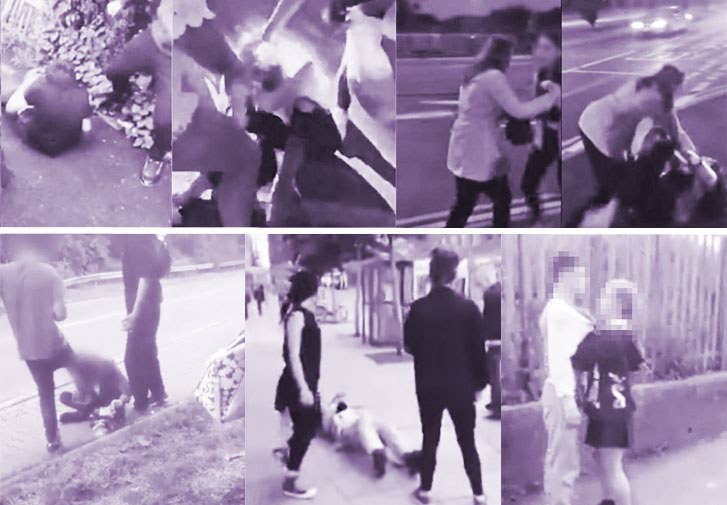
On 13 May, outside a school in Croydon, south London, a 14-year-old girl grabs a boy by his shirt, her face inches from his. She shouts: “Are you gonna cry? Don’t fuck with me, I’m not a pussy, you understand, yeah?”
Still wearing her school uniform, she punches the boy hard in the head. He is also 14 but a good six inches taller. He doesn’t fight back.
The incident was captured on a smartphone by a witness, who can be heard saying “she’s gonna get herself put in jail”. Within 24 hours the footage passed from friend to friend and then to the Facebook page Young Rich Britain (which has now been shut down).
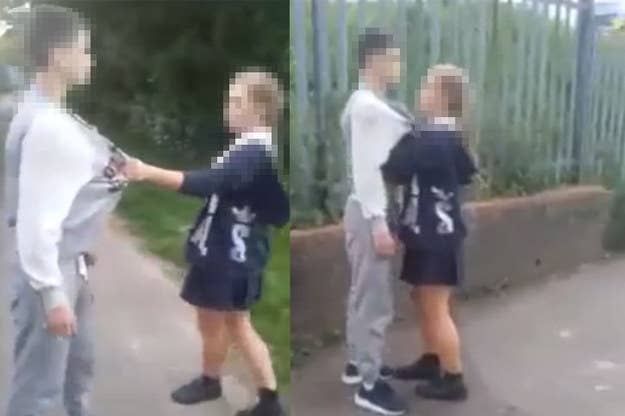
Before being taken down it was viewed 2.8 million times and featured in local and national media. Tipped off by someone who'd seen the video, police arrived at the girl's home in a housing estate in New Addington a day later.
And two days later, the girl – who can't be named because of her age – appeared in Croydon Youth Court to plead guilty to assault and was sentenced to eight months' detention in a young offenders' institute, partly due to her breaching a pre-existing behaviour order.
This was one of the latest in a long line of cases in which British teenagers appear to have been convicted because footage of them committing crimes went viral.

It's also part of a trend where people publicly accused of crimes face an online court of public opinion before the legal system kicks into gear.
Lisa French of Foxes Solicitors in Bromley, a criminal lawyer of 30 years' experience, defended the 14-year-old girl in court and is in no doubt that the huge social and news media attention the video gained contributed to the severity of the sentence.
She told BuzzFeed News: "In all honesty, although it was a very unpleasant incident, had it not have gone viral or been here, there and everywhere ... it didn't pass the custody threshold in my opinion. It was unpleasant but it wasn't particularly violent. Of course, with the baying crowd … the lay magistrates looked at it and because of the media interest I think they had to do something."
She added that the use of social media evidence in court is becoming more common and that it's unlikely that the police would have heard about the incident at all if it were not for the viral video.
BuzzFeed News has identified cases involving 22 British teenagers from the last four years, some as young as 13, who were arrested, charged or convicted due to evidence filmed on mobile phones and uploaded to Facebook, Instagram, Twitter, or YouTube.
And we spoke to legal experts and senior police figures who agree that something has fundamentally changed when it comes to the way young people interact with social media and the criminal justice system.
Arrests relating to things people say on social media are nothing new – two men were jailed for four years for inciting violence during the 2011 London riots on Facebook and there have been thousands of arrests relating to offensive or malicious messages, more commonly known as trolling.
This is people being arrested for real-world crimes – such as assault, robbery, and intent to commit actual bodily harm – through digital technology.
In one of the most notorious recent cases of a street crime going viral, this week a 16-year-old girl was sentenced for a violent, bullying attack (below) that was viewed millions of times in July.
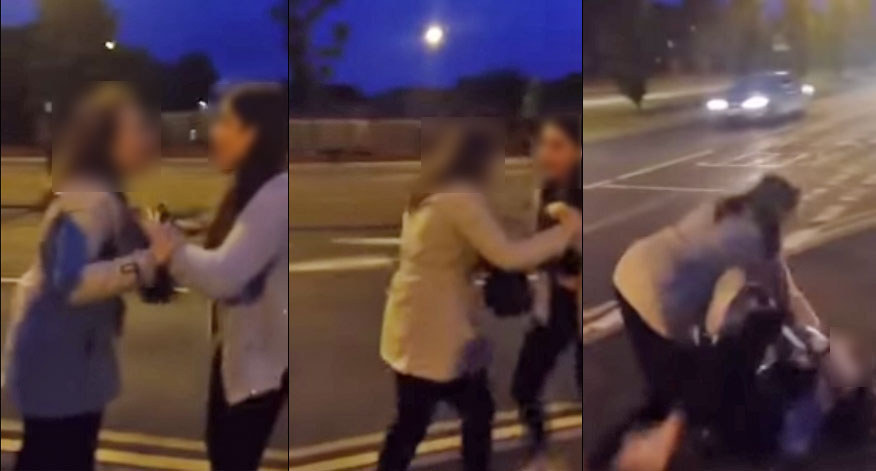
A grainy mobile phone video showed the girl stood over her victim, a girl two years younger, telling her to get on her knees and beg for forgiveness.
She says: "Get on your knees and say sorry. How many times do I have to ask you? Don't laugh either, otherwise I'll hit you in the fucking face. Who do you think you are?"
The attacker forces her victim and another girl to take off their shoes, she empties a handbag, throws it into the road and then hits one girl in the side of the head.
The shocking ordeal went on for several minutes on a busy road outside a supermarket petrol station in the Northfield district of south Birmingham on the evening of 11 July. (The Crown Prosecution Service has yet to decide whether to bring charges against a second girl in relation to the same incident).
Incidents like these are not always reported to the police, such is the shame of the victim and the fear of being called a "grass".
But this is 2015. Within 24 hours, a mobile video of the incident had found its way on to Facebook, where it was viewed more than 7 million times (the real figure is much higher due it being copied and pasted on many Facebook pages and websites).
And four days later the 16-year-old – who can't be named for legal reasons – pleaded guilty to robbery and assault at Birmingham Youth Court. She claimed she was drunk and couldn't remember the incident.
On Monday she was sentenced to a 10-month referral order and ordered to pay £500 to two victims, narrowly dodging a custodial sentence. Her victims will help decide what she does during her sentence to make "reparations".
DC Michelle Beasley of West Yorkshire police said: "While it is only right the victims in this case have a say in how this girl will make up for what she has done, her real sentence is the video of her appalling behaviour, which is likely to remain on the internet, haunting her for many years to come."
The Croydon and Birmingham cases are just two of many such examples of social media being used as key evidence in street crime cases.
In July, a 15-year-old girl’s mum posted a video on Facebook showing her daughter apparently being bullied by a group of girls in a park in Dartford, Kent (two 16-year-old girls were arrested and bailed until 1 September).

There were the three 13-year-old boys who were arrested on suspicion of assaulting a 12-year-old in Bradford in June. West Yorkshire police told BuzzFeed News two of the boys are expected to face trial at Bradford Youth Court this month.
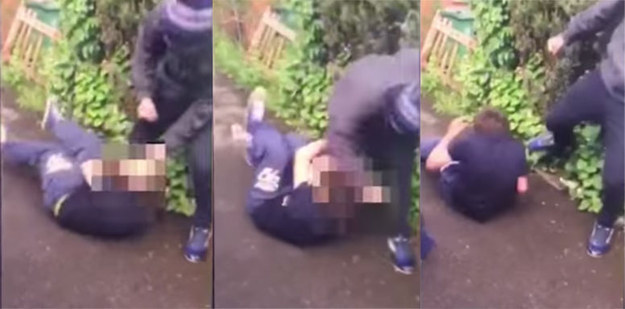
In June, a video emerged showing a 17-year-old boy in Swindon being forced to kiss a shoe. He is told: "Do you want a broken jaw? Do you want a broken jaw? Get on your fucking knees and kiss his shoe. Kiss his shoe now." As a result, one 14-year-old boy was given a 18-month youth rehabilitation order.
All these cases follow the same pattern: An attack is carried out by one or more teenagers on other teenagers, it's filmed by either the attacker or a witness, it goes viral, and someone alerts the police, who then make an arrest.
This has created a whole new genre of police press release, which says something like: "We'd like to speak to the person from this worrying video."
But there's something sinister happening too: The viral crime has given rise to the viral crime vigilantes.
In the Birmingham bullying case in July, between the video going viral and the girl being sentenced, various Facebook pages, some with more than 30,000 likes, not only named the 16-year-old (at that point still just a suspect) but posted details of her school, mobile phone number, social media profiles and other personal details.

One Facebook page, still online, has more than 25,000 likes and repeatedly refers to her as "Cunt of the year". There were various fake and parody accounts set up in her name across various social media.
The girl received thousands of deaths threats, was remanded in custody for her own safety and had "Bully" and "Scum" daubed on her front door, while a selfie from her Facebook account was widely mocked. The Sun reported that the girl and her mum were forced to leave the house.

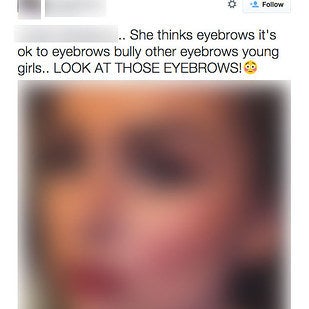
Lisa French, who represented the 14-year-old in Croydon, told us that this court of public opinion doesn't just affect the accused but their family too: "They [online commenters] made really disparaging and derogatory remarks about her parents as if it was their fault, when it couldn't have been further from the truth.
"It was as if she comes from a sink estate family, but she certainly doesn't – she has two very respectable parents who are their wits' end with this child. And she is a child. That's what really angered me."
Has social media simply made police officers' jobs easier?
Speaking last year, Alex Marshall, CEO of the College of Policing and a former chief constable of Hampshire police, said that as many as half of calls passed on to frontline officers originate online somehow.
Marshall told BuzzFeed News it was impossible to verify that figure but confirmed that social media had profoundly changed police work, particularly for local community-based teams.
"Not every person who's drunk and disorderly gets arrested – they might get a warning to wind it in and go home," he said. "If 3,000 people phone up and complain about that one person who is doing the equivalent of being drunk and disorderly but it's online, we in the police have still got to remember just because lots of people have seen it, we've [still] got to be proportionate and we shouldn't leap in to solve every problem that emerges online.
"Having said that, there would have been crimes that went unnoticed before which now are brought to the attention of the police and if we'd have known about them previously we would have dealt with them, such as someone being seriously assaulted."
Marshall acknowledged the big gap in age between the typical police officer, who might be in their mid-thirties, and teenagers who live their lives through social media: "Very young people are exposing to the world things that my generation never would have done, and it's going to be there for the rest of the lives and I think this is dawning on us all.
"Not only has that person come to notice in a way they previously wouldn't have done, we also have to think, are they also at risk? We are talking about children. It's not uncommon for a child to be involved in crime and also to be the victim of crime.
"First base with any child is what's their vulnerability as well as what they've done."
Is this really a new phenomenon? Would these cases have come to the police’s attention and been handled the same way if it wasn’t for their online popularity?
David Banks, a media law expert and writer, told BuzzFeed News: "There is no doubt that if someone has committed an appalling offence they deserve to be caught and prosecuted according to the law.
"But I've no doubt that these bullying behaviours go on elsewhere in other contexts and haven't been documented, don't give rise to the viral video, and the perpetrators go unpunished.
"With this we have police taking action in Birmingham, but in another circumstance you might have someone going into a police station and saying, 'I've been bullied by some kids' and the police would say, 'Well, have you got any evidence?'
"But because it gets captured on video it gets a disproportionate amount of attention. And is that unjust? There's a question there as to whether we are paying disproportionate attention to groups of offenders solely because they are caught on video doing something."
